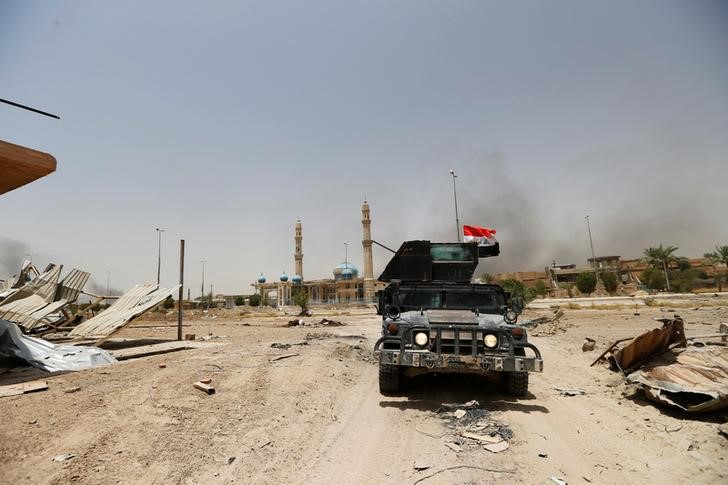By Stephen Kalin and Ahmed Rasheed
FALLUJA, Iraq (Reuters) - The rapid entry of Iraqi forces into central Falluja last week surprised many who expected a drawn-out battle with Islamic State for the bastion of Iraq's Sunni insurgency, where some of the toughest fighting of the U.S. occupation took place.
The campaign has offered Prime Minister Haider al-Abadi respite from a political crisis that paralysed government and turned violent when demonstrators breeched Baghdad's heavily-fortified Green Zone.
Yet questions remain about whether Abadi - who declared victory on Friday even though Islamic State militants are still fighting in Falluja - can convert those military gains into political success, and what kind of model Falluja offers for the next major military campaign, against Islamic State-held Mosul.
Abadi and his commanders, who have pledged to retake the northern Iraqi city later this year, "needed a fast victory because they are very aware of setting precedents," said Renad Mansour, an Iraq scholar at the Carnegie Middle East Center.
But "Falluja was a distraction. The protests in Baghdad will come back. People will say, 'OK we got Falluja, what's happening politically? What are the changes?'"
Iraq's government has been gridlocked for months after rivals blocked Abadi's plans for a cabinet reshuffle he said was aimed at fighting rampant corruption in a country nearly bankrupted by low global oil prices.
Thousands of demonstrators, mostly loyal to Shi'ite Muslim cleric Moqtada al-Sadr, took to the streets earlier this year to pressure Abadi to replace party-affiliated ministers with independent technocrats, which the political elite has resisted.
The prime minister's decision to attack Falluja last month, against the apparent wishes of U.S. allies, allowed him to rally the Shi'ite political class who were pressing him to retake the city, seen as a launchpad for recent bombings in nearby Baghdad.
Falluja has been seen as a stronghold of Sunni Muslim insurgents for more than a decade and U.S. forces that toppled Saddam Hussein, a Sunni, suffered heavy losses there in two battles in 2004. Iraqi forces have so far incurred a fraction of those casualties.
"The $6 million question is: do (the militants) head for Mosul, do they stay in Falluja, do they do asymmetric attacks elsewhere?" said an official from one of the countries in the U.S.-led coalition backing Iraqi forces.
More than 85,000 people have fled Falluja, according to the United Nations, which estimated the population before the operation began at around 90,000, already just a third of its size before Islamic State seized control in early 2014.
A lawmaker close to Abadi said the offensive had helped him overcome a perception of weakness among powerful rivals and ordinary Iraqis.
But another lawmaker and a Western diplomat said that while Falluja advances are bound to give the prime minister a "feel-good factor" in the short term, there is no indication they will help advance his political agenda.
"When parliament resumes he'll probably point to Falluja," the diplomat said, but the demands of lawmakers and the street are "not going to go away because Falluja's been liberated."
LESSONS FOR MOSUL
The Falluja operation has, at least, provided a possible model for the offensive in Mosul, Islamic State's de facto capital in Iraq, which is still being planned, according to Iraqi and Western officials.
The assault was spearheaded by Iraq's elite counter-terrorism service, which has learned to fight the jihadists' mix of guerrilla and conventional tactics, with army and police units also taking key positions. Around 85 coalition air strikes supported the advances.
Iranian-backed Shi'ite militias, which stirred fears of sectarian violence by insisting on entering the mostly Sunni city, were confined largely to the outskirts, but they still stirred controversy.
Days after Abadi announced the assault, Iranian media published pictures of what they said was a visit by Iranian General Qassem Soleimani to Shi'ite militias fighting alongside the army.
Soleimani also appeared during last year's battle for Tikrit where Shi'ite militias were accused of rights abuses.
An Iranian news outlet said he moved in recent days to Syria, where Iranian-backed militias are supporting Syrian President Bashar al-Assad against Sunni rebels.
Even playing a peripheral role in Falluja the militias faced allegations from the local provincial governor, which they denied, that they executed 49 Sunni men and detained more than 600 others.
"You've got to give Abadi credit for keeping the militias out of Falluja," the Western diplomat said, adding that the government had quickly put an end to the alleged abuses.
Authorities have made arrests in relation to the claims, but the United Nations reported on Wednesday further allegations of serious rights violations by armed groups fighting alongside the military in Falluja.
"Abadi has minimal leverage over these Iranian-backed militias, so if anyone is actually held accountable, it would indicate Abadi's rising political weight," former U.S. diplomat Robert Ford said in a recent article.
But residents of Mosul who spoke to Reuters by phone and internet said they feared similar abuse if Shi'ite militias were allowed to participate in the offensive on their city.

"We saw what happened in (Falluja) and it confirms our decision to refuse the Hashid Shaabi," Nineveh provincial councilman Abdul Rahman al-Jubouri told Reuters in Erbil, referring to the coalition of mostly Shi'ite militias allied to the government.